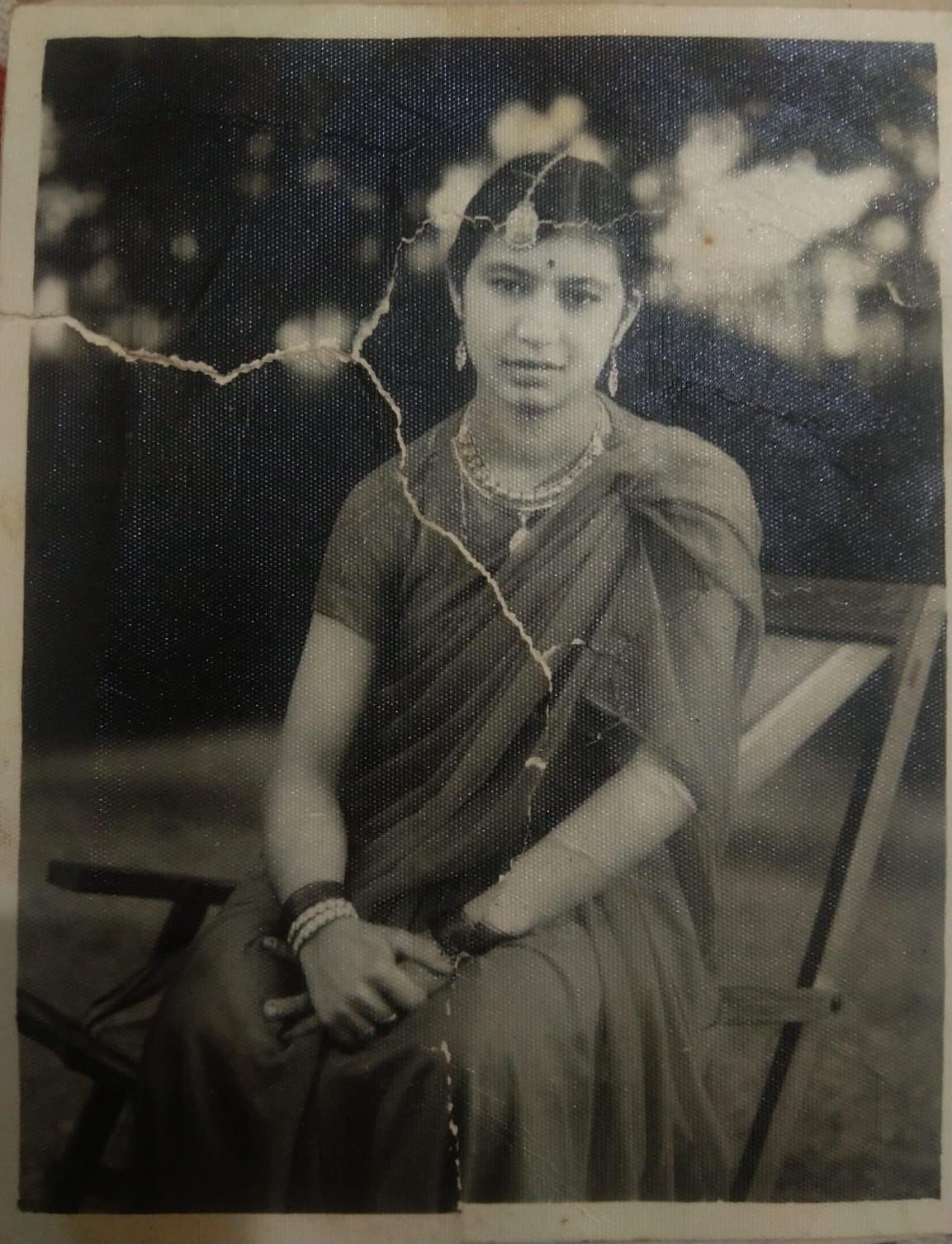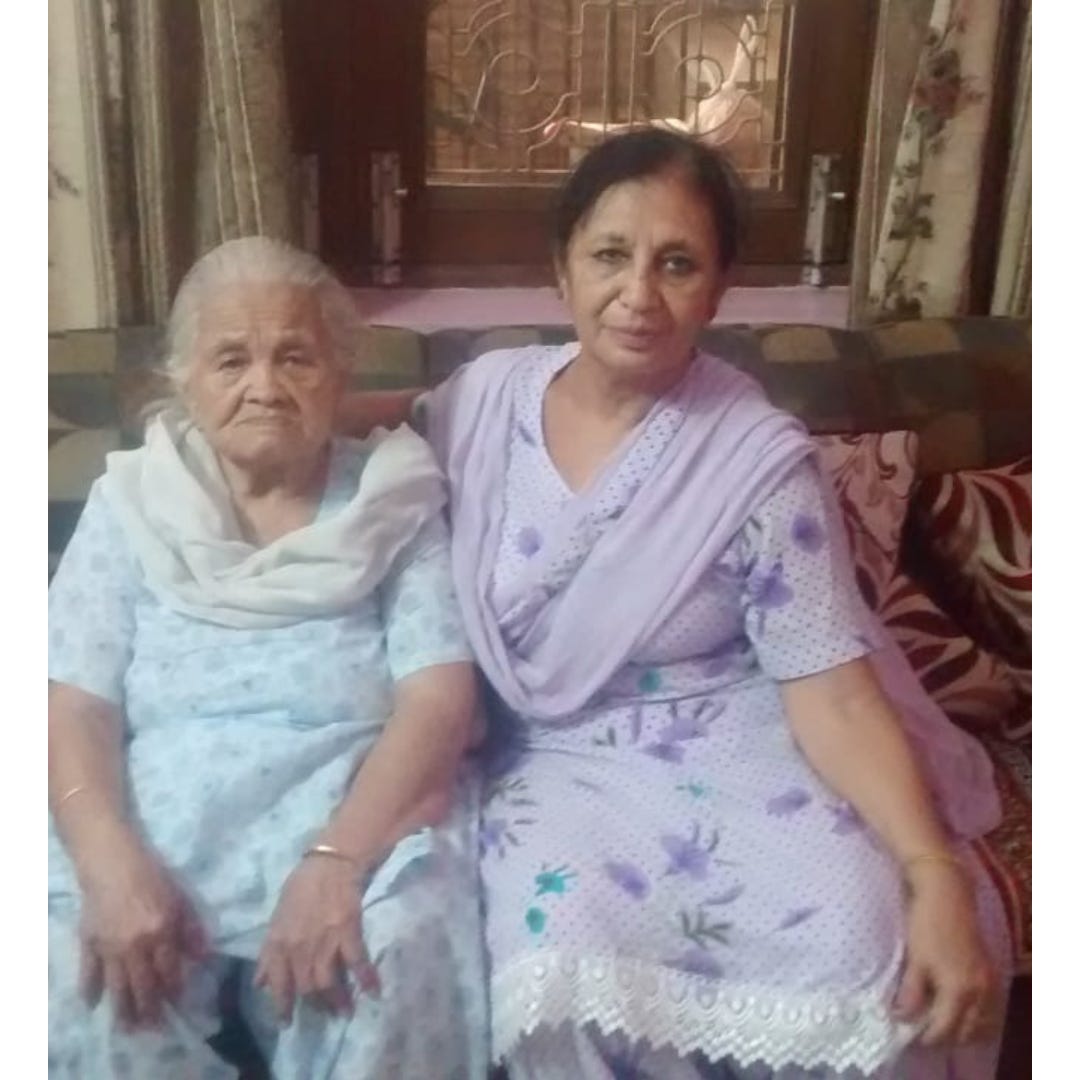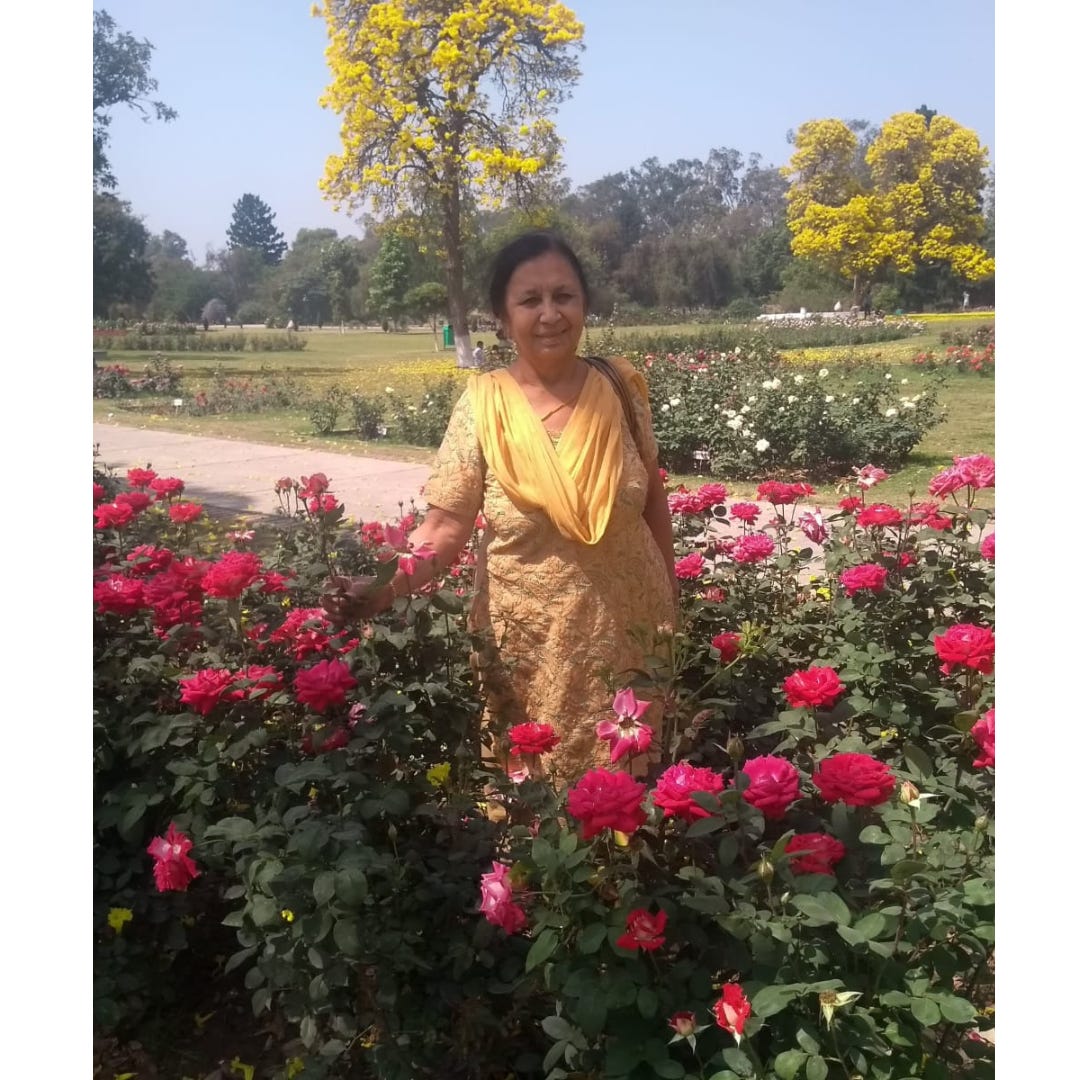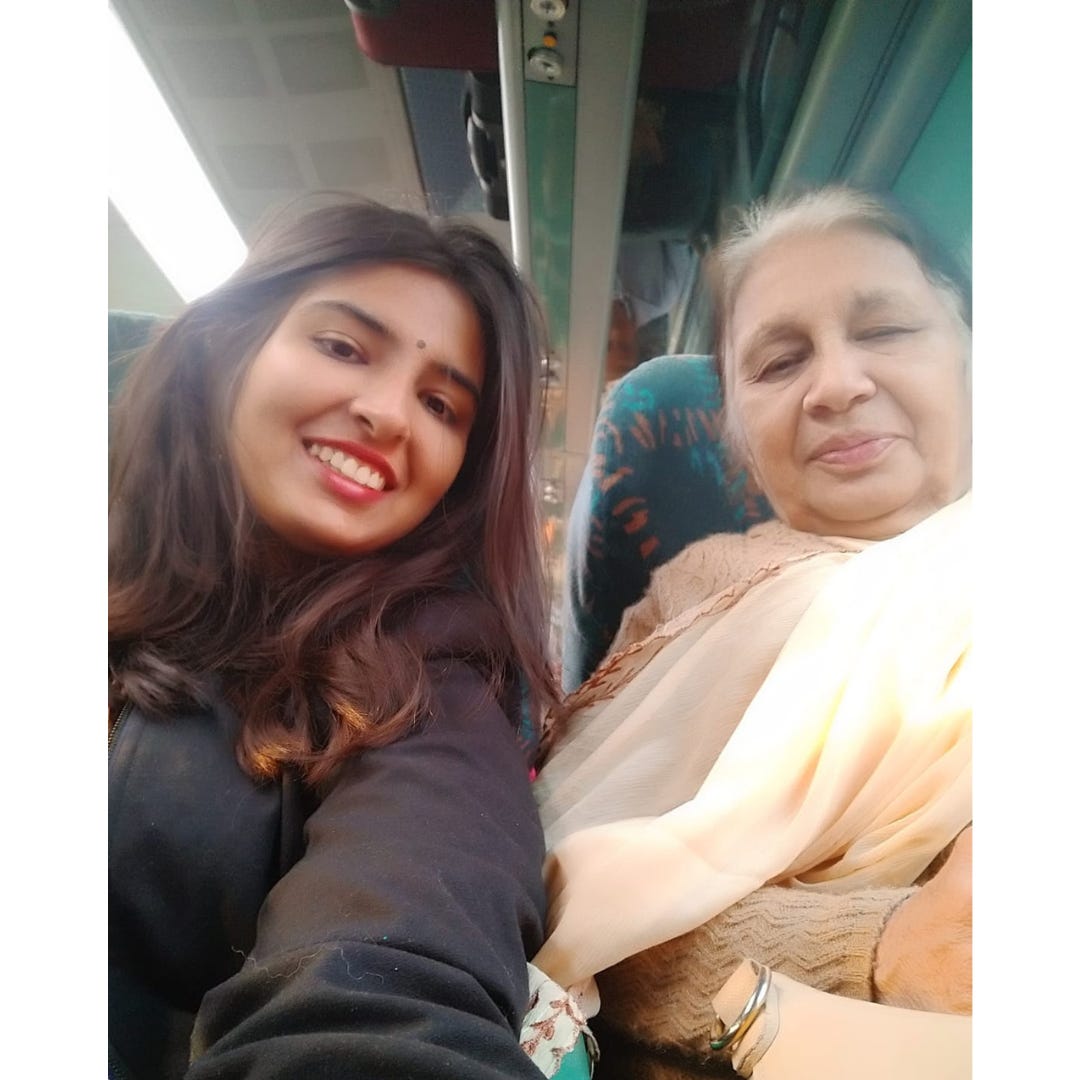On 27th May 2022, around half past seven in the morning I got a call from my mother. Dadi had breathed her last. I was in Dehradun at the time, and instead of sadness or shock, I felt a vague sense of relief on hearing the news. Dadi had been on bed for almost a month by then, her body giving up one organ at a time, but with great rapidity. I booked a bus to take me home at the earliest. I could have made it to her funeral had I taken a flight. But I am, firstly, not crazy about attending funerals, and will avoid them at every given chance. And, then, I reasoned if attending the funeral would make any difference after I had failed to be with her during her last conscious days. That entire day I remained untouched by the gravity of the loss- during the bus journey back home, and even when I found myself surrounded by her children, grandchildren, sisters and neighbours in the room where dadi and I used to so often sit together. It was only the next day that tears began to flow down my cheeks as we sat together in a collective three day long prayer. Like dadi’s sickness, the sense of loss did not hit me suddenly, but grew more real with each passing moment.

Before the death of my dadaji in 2018, I had been curious about what it might be like to lose someone you’ve known all your life. In the days immediately following his demise, when his last rituals were still being performed, the house seemed to be enveloped in a dense cloud of gloom. I had watched a movie on the night of his funeral to escape the heaviness around. But his death did not move me, not a single tear was shed. In the following years, I felt the effect of dadaji’s death only through the loneliness it brought upon dadi. A year later, my nanu passed away. This time I witnessed my mother and my maasi’s grief and I, too, broke down. On somedays, I would visit nani at her house and nanu’s absence would strike me. But it did not leave a hole or, even a dent on my life. The stoicism in the face of deaths of ones I had known so closely left me feeling confused, even a little proud. But with dadi’s passing, the illusion of stoicism made way for grief so strong and so persistent that it left me sick.
A few days later, I returned to Udaipur to resume work while my family traveled to Haridwar for the last rites. I soon fell back into the rhythm of the everyday. However, after a few hours of being awake and working, my body would struggle to move or even sit upright. It longed for the all-accepting embrace of the bed. I would try to push myself to be more active, but an overpowering sense of fatigue would set in. I could find no strength to clean the room since I had returned, none to even watch a movie or read a book. I started skipping dinner as my appetite shrank, but also because I had no energy left to help cook, or even fetch it. My hair started falling out in bunches- they were all over my pillow when I woke up, on the marble floor after I combed, the bathroom drain after I had washed them. The gums became swollen and itchy. I peed a different colour and smell. I struggled to decipher the message that my body was trying to convey. Could my mind be playing tricks on me? Did I simply have to push through harder? Was I being lazy? I was confused. I wasn’t PMSing, which could have explained at least some of the symptoms. I wondered if it could have anything to do with dadi’s departure. But I brushed off the thought quickly. No one had told me that grief could do bizarre things to your body. And then, I didn’t know I was grieving. Dadi’s death, as had her sickness, left me sad, but hadn’t I already made my peace with it? Hadn’t I let myself to cry it all out while I was at home? Why, then, would the body take it upon itself to grieve so dramatically, I questioned.

I got some tests done. Except for cholesterol marginally crossing the upper limit and signs of fatty liver, the report declared me healthy (I learnt later that grief could cause inflammation, and fatty liver could be a sign of acute stress). It was only when a friend suggested that my body seemed to be mourning the loss of my grandmother, that I found myself googling physical symptoms of grief. In a personal blog (that I am unable to locate now), a woman shared how her hair started falling out after her mother’s death. Fatigue, loss of appetite, nausea and inflammation were some other commonly listed symptoms of grief on general blogs.
I began searching for other’s experiences of grief as a reassurance. That I was not alone. That I was not “over reacting”. That it was not just my mind being laggard. The search took me to a quote from CS Lewis’ book A Grief Observed that he wrote after his beloved wife’s death-
“And no one ever told me about the laziness of grief. Except at my job - where the machine seems to run on much as usual - I loathe the slightest effort. Not only writing but even reading a letter is too much. Even Shaving.”
The lines pacified my anxiety to some extent, and I felt somewhat less alone. I was not over reacting. Neither was I being weak or lazy. It was grief. I was grieving. I began reading the book for the same reason Lewis had written it- “as a defence against total collapse.”
For many days after her death, and after my body had recovered from the shock, I carried the realisation of my dadi’s absence like a shadow- the shadow that grew darker, and more dense every time I visited home. There was no more stopping by at her floor when I stepped outside, or into our building; no more sleeping at the ground floor at nights because dadi was scared to sleep alone; no more nagging sense of responsibility to alleviate her loneliness; no more watching reality shows with her on weekend nights; no more hot rice served with her exquisite Burmese dishes and condiments; no more visits to the Saturday market from where she would promise to buy only a few things but would inevitably end up with a bag full; no more assisting her to see photos and videos that her extended family and neighbours sent on WhatsApp; no more bringing maawa from Rajasthan each time I visited; no more hearing same old stories about her life in Burma; no more making tea for her in the evenings; no more being told on phone- “Ritu, kab waapis aayegi, mann nahi lag rha (Ritu, when will you come back, I feel alone)”; no more ringing of the bell to give us pakoras made crispier with rice flour, sherbets made from fresh fruits, sweets of all kinds and other things only she could make. No more dadi. There was no dadi anymore. On one such visit home, I remember breaking down silently for three consecutive nights. The sadness felt unbearable especially when it came without invitation or even an intimation. It had caught me inattentive, and it held me hostage in my own house, in my own bed until I had no tears left to spare.

As the year passed by, the awareness of her absence felt less continuous. Time heals, as the cliche goes. I sometimes found myself staring into the void where dadi would sit- always the first seat of the sofa from the left, next to the hand-rest, facing the flat screen. It would be harder on festivals, Saturdays and weekends but my attention was directed to the void less and less frequently as time flew by. It felt that I had finally made peace with her departure.
That is until a week preceding the day that would have marked the first year of death. The familiar sense of fatigue had returned. Once again, I was waking up tired. Once again, I was finding it harder to push through the day. But this time I could recognise it as a visit from grief. I had read about the recurrence of grief, and daresay, I almost expected it to find me again- sooner or later.
“Tonight all the hells of your grief had opened up again; the mad words, the bitter resentment, the fluttering in the stomach, the nightmare unreality, the wallowed-in tears. For in grief nothing ‘stays put.’ One keeps emerging from a phase but it always recurs. Round and Round. Everything repeats…
…How often will it be for always? How often will the vast emptiness astonish me like a complete novelty and make me say, ‘I never realised my loss till this moment?’”
Once again, I took refuge in Lewis’ words written in grief so much more intense than mine. I never realised my loss till this moment. Like time, grief too is a mystery one can expect to know intimately but never understand.
I wanted to write about my relationship with my dadi before a year of her death would come to a close. I had started writing it soon after her passing but, life and feelings of inadequacy took precedence. I restarted it several times throughout the year. However, whatever words I could find would be accompanied by spells of crying. After several unsuccessful attempts I realised that I needed to first write about what her death meant to me. Only then, could I hope to find words and the strength to write about everything dadi meant to me while she lived.
The essay was first published on The BlahckSheep in June 2023. However, due to editorial conflicts, I decided to remove it from there and republish it on my Substack instead.




So beautifully written. Went through a similar scare recently with my own Dadi and this piece just comforted me in its own way. I hope grief finally leaves your body after teaching you all it has to. Hugs!
Hugs <3